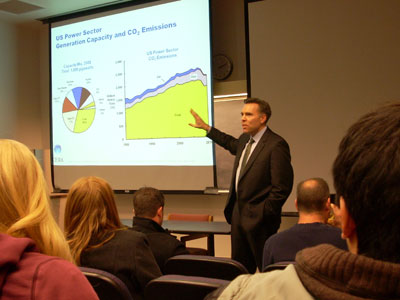It is widely agreed that the United States, as one of the biggest polluting countries, needs to find a way to reduce carbon emissions. But actually fitting it into the government and economy is a completely different story.
The Economics and Business Department brought Robert LaCount of Cambridge Energy Research Associates (CERA) to Mines last Thursday to talk about this very thing.
As LaCount explained in his lecture, “Perspectives on Clean Energy and Climate Change Policy,” an important step in the journey to reducing emissions is the shift to natural gas. New developments have recently given companies the means to tap into more gas. “It’s in tight shale, where we can go in now and unlock that natural gas. And we always knew it was there, we just didn’t have the technology to unlock it economically.” All the new places that can produce natural gas now have increased the supply and allowed the price to go down.
This is great news from the environmental perspective because, “with the lower carbon content of natural gas as well as the higher efficiency of those technologies, gas emits carbon dioxide emissions at 40% of what a traditional coal plant would emit.” LaCount sees natural gas as “a not only reliable but an affordable way to move from some of the existing coal dependence to natural gas and have a lower carbon exchange for that movement.” He also emphasized that gas is “not the end result. You can’t get there and meet the target with natural gas.”
A well-educated, energy-conscious Mines student could tell power companies about all the alternative ways to producing energy. But this would not change things. As LaCount puts it, “If I want to move and make the investment, for instance, of nuclear over gas, today the market is going to choose gas.” To firms wanting to maximize their profits, the environment does not matter. It is the market that drives their decisions.
“How do you get a company to move over to nuclear? It comes back to carbon prices.” LaCount shared his thoughts on the idea of charging companies for the pollution they emit. In this case, coal companies would have to pay for all the carbon dioxide they are giving off. Hopefully, this will lead to more coal plants shutting down and “greener” alternatives coming up.
This is a classic idea shared by many economists looking for policies to reduce carbon emissions. But there is a problem with implementing this change. According to Robert LaCount, “If you’re really going to put a big dent in emissions, the cost is considerable.”
Over the past two years, Congress has considered plans to begin a carbon dioxide price. The goal is to charge companies and change the market so that shutting down a coal plant is actually the best economic decision for a firm. Unfortunately, the situation is not that easy. LaCount explais, “Typically you had a lot of studies showing prices that would be $12, $25, maybe $30. Not the kind of range that we’re talking about here, that we think would be necessary to make those coal plants uneconomic.”
Controlling pollution in the transportation industry has the opposite problem as the power industry. Emissions that come from transportation do not need much more regulation, “In fact, the policies are already happening. We have significant regulations going forward that are pushing new technology dramatically.” So instead of lacking strict policies to force companies to use newly available technology, car companies have high standards, just not the means to produce up to them. “Many of these regulations or laws that have been passed are requiring technology and tools that do not exist today.”
The transportation section of the economy will find new technologies and their emissions will eventually decrease. LaCount showed his audience that it is the power section that needs drastic work. The proposals for climate change policies have been reviewed since 2008. LaCount observes, “These are all brand new areas of policy for us. [Trying] to do that all at the same time is quite a task.”
He suggests a gradual change adding on policies when they would most effective and continually adjusting to what the country needs in order to bring it towards healthier air, while still maintaining a healthy economy.



'Perspectives on clean energy and climate policy' has no comments
Be the first to comment this post!